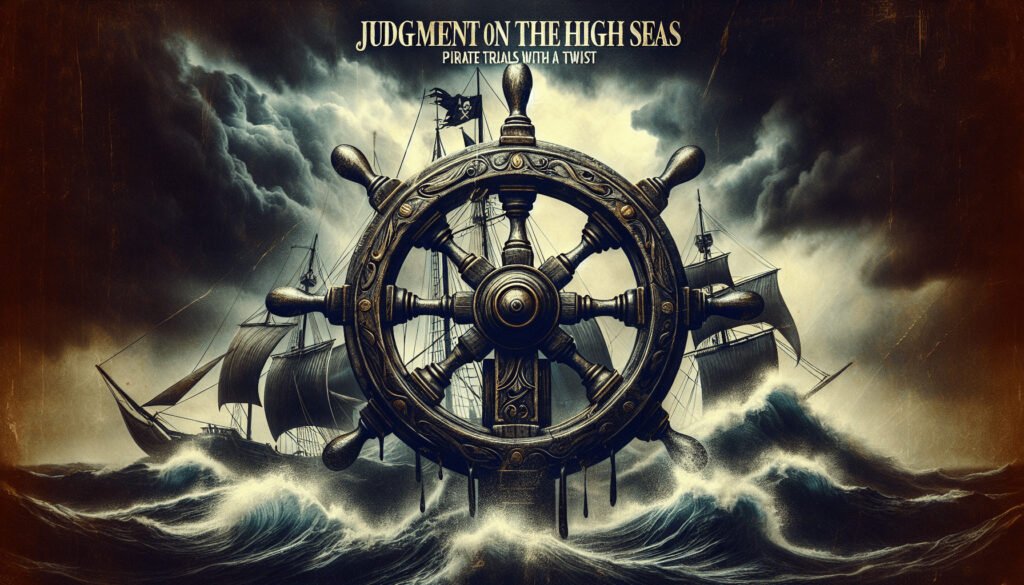Have you ever wondered what it would be like if we held pirate trials today?
Judgment on the High Seas: Pirate Trials with a Twist
We’re not talking about Johnny Depp charming a courtroom in eyeliner or Keira Knightley screaming about pirate codes. No, this is about the real-deal swashbucklers getting judged in some kind of floating kangaroo court where the gavel is a rusty cutlass, and the judge is probably drunk on rum.
Who Are These Unlucky Souls?
We often romanticize pirates as these lovable rogues who just want to steal shiny things and say “Arrr” a lot. But let’s be real for a second, they were criminals. Imagine pirates today facing trials, and the judge asking, “So, Captain Blackbeard, how do you plead?” And Blackbeard responding with, “Guilty of being fabulous, Your Honor!”
So, let’s break it down. The nitty-gritty of pirate life revolves around plundering, kidnapping, and generally being the worst house guests ever. They were like your ex who refused to leave, but with swords and syphilis. These trials aren’t just historical but filled with dark, gloomy corners of the human soul—with a sprinkle of rum and a dash of insanity.
The Courtroom of Misfits
Think of the pirate courtroom as the awkward family reunion where everyone’s disowned each other but still shows up for the BBQ. You’d have a judge—probably an ex-pirate who found religion or at least a semi-reputable wig dealer. The jury would be a motley crew of landlubbers and sea rats, struggling with the fact they’re about to deliver judgment while likely plotting their next big heist.
And the defendants? Oh, honey, they would be a treat! Imagine a pirate trying to explain to a modern jury why it’s totally fine to engage in pillaging because, “Hey, everyone needs a hobby!”

A Day in the Life of a Pirate Trial
Morning session kicks off with the usual pleasantries—the judge arriving 45 minutes late because his parrot Boris refuses to get off his shoulder. Opening statements include the prosecution saying, “He killed 50 men, stole 20 ships, and here’s the worst part—he double-dipped into the community guacamole.”
Exhibit A: The Pirate Code
Let’s talk about the Pirate Code for a moment. It’s basically the original version of “terms and conditions apply.” Pirates loved their codes as much as today’s tech geeks love open-source software. And what’s hilarious? They took these “laws” way too seriously. Imagine a pirate losing his leg and another pirate saying, “Bad luck, mate. Clause 15, subsection B, says you owe me a gold doubloon for that.”
Legal Representation—Pirate Style
Ever wondered who would represent these pirates in court? Their legal team would probably be a cross between Saul Goodman from Breaking Bad and Captain Jack Sparrow. And guess what? These pirate lawyers were just as likely to abscond with the courtroom as they were to win a case. Their defense strategies would range from, “He didn’t do it, and if he did, it was totally worth it!” to “Your Honor, do we really need laws? They’re just, like, guidelines, right?”

Judging the Judge
Now the judge in these trials, oh, what a character! If you’re picturing an upstanding citizen with a powdered wig, you’ve got another thing coming. The pirate judge would probably proclaim a death sentence while trying to figure out how to smuggle his next haul under his robes. He’s the type who’d end the trial with, “You’re sentenced to walk the plank right after happy hour!”
What About Modern Pirate Trials?
You’re probably thinking, “This can’t be real, can it?” Well, we actually have modern pirates. Yeah, Somali pirates have tried their hand at 21st-century plundering, but without the fashion sense.
Here’s the twist: Modern pirate trials aren’t held on ghost ships but in national courts, and it’s a lot less fun. Picture a pirate in a gray suit trying to look inconspicuous, a far cry from the ruffled shirts and skull necklaces. They’re judged through international maritime law—basically the UN for people who steal yachts.
The Verdict – Fit for a Pirate?
Now, let’s ponder the verdicts. Traditional pirate sentences ranged from hanging (classic), marooning on a deserted island (like being voted off Survivor but less sunscreen), and sometimes even redemption if they agreed to work for the Crown. Today’s pirates get prison sentences in places like the U.S. and Europe. Imagine Blackbeard serving time in a facility with yoga classes and organic meals. It’s hardly the dramatic hanging at dawn you’d expect.
Tables of Pirate Sentences: Then and Now
| Verdict | Traditional Pirate Trials | Modern Pirate Trials |
|---|---|---|
| Hanging | Happened almost instantaneously | Reserved for extreme cases, rare |
| Marooning | Common, almost traditional | Not practiced |
| Serving the Crown | Sometimes offered | Not an option |
| Prison Time | Rare, mainly for recruitment | Standard, sentences vary |
Closing Moments – What We Can Learn
What’s the takeaway here? Aside from the obvious—don’t become a pirate unless you’re into complicated trial scenarios and possible hanging—is that crime and punishment have evolved. Today, the drama of pirate trials seems quaint. But deep down, the spirit of these judgments showcases society’s eternal struggle with law, order, and what constitutes justice.
So, next time you’re reading about pirates or maybe watching “Pirates of the Caribbean” for the 546th time, remember: The real drama was in the courtroom. I mean, who needs reality TV when you’ve got pirates defending their right to plunder with a wink and a nod?
Reflecting on the High Seas of Justice
Pirate trials, both past and present, allow us to explore the complexities of justice and morality. While we love the fantasy of swashbuckling adventures, the real-world implications demand a more nuanced understanding. What’s important is that the verdicts rendered, either with a ghostly gavel or a modern bench hammer, reveal more about our society than the pirates themselves.
So, matey, would you dare face judgment on the high seas, or are you more comfortable in your landlocked courthouse? One thing’s for sure—wherever the trial, justice has a way of finding its own course, even on the wildest waters.